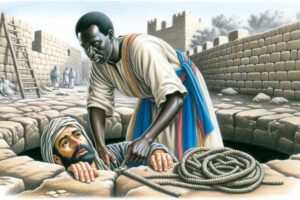
David: Second king of Israel, a ‘man after God’s own heart’
David, the second king of Israel, is one of the most significant figures in the Hebrew Bible. Here are some quick facts about him:
- Anointment as King: David was anointed as king by the prophet Samuel while still a young shepherd, chosen for his heart rather than his appearance (1 Samuel 16:1-13).
- Victory over Goliath: He gained fame for his bravery by defeating Goliath, a giant Philistine warrior, using only a sling and a stone (1 Samuel 17).
- Reign as King: David reigned over Israel for 40 years (2 Samuel 5:4-5), uniting the tribes and establishing Jerusalem as his capital.
- A Man After God’s Own Heart: David was described by God as a “man after His own heart” (1 Samuel 13:14; Acts 13:22). This designation signifies his deep faith and flawed yet repentant character.
- Contributions to Worship: He is credited with organizing the temple worship (1 Chronicles 23-26) and contributing to the Psalms, a collection of songs and prayers expressing the breadth of human emotion.
- Dynastic Promise: God made a covenant with David, promising that his lineage would endure forever and that his descendant (ultimately understood as Jesus Christ) would reign eternally (2 Samuel 7:12-16).
- Complex Legacy: David’s life was marked by profound highs and serious lows, including his moral failures such as his adultery with Bathsheba and the murder of her husband Uriah (2 Samuel 11).
David’s life, as depicted in the books of Samuel, Kings, and Chronicles, offers a complex portrait of a shepherd, warrior, poet, and king whose legacy is central to both Jewish and Christian traditions. Here’s a detailed and comprehensive analysis of his life:
Early Life and Anointment
David was the youngest son of Jesse from Bethlehem. Despite his humble beginnings as a shepherd, he was anointed by Samuel to be king over Israel, chosen for his heart and faith in God, not his outward appearance (1 Samuel 16:1-13). This anointing unfolds as part of God’s plan to move Israel from the tumultuous judgeship of Saul, who had disobeyed God, to a more faithful leadership.
David and Goliath
The story of David and Goliath (1 Samuel 17) is perhaps the most famous episode of his life. As a young shepherd, David demonstrated profound faith and courage by volunteering to fight Goliath, a giant Philistine warrior. Armed only with a sling and five stones, David’s victory was a testament to his reliance on God rather than military might. This event marked his rise to national prominence.
Rise to Power
Following his victory over Goliath, David entered the service of Saul, King of Israel. His successful military exploits and his close friendship with Jonathan, Saul’s son, made him popular, which fueled Saul’s jealousy. This led to David fleeing and living as an outlaw, during which time he amassed a following and continued to demonstrate his leadership and commitment to God.
Despite multiple opportunities to kill Saul, David refrained, showing his respect for Saul as God’s anointed king (1 Samuel 24 and 26). After Saul’s death, David was anointed king over Judah and, later, all of Israel. His reign marked a unifying period for the tribes of Israel.
King of Israel
As king, David conquered Jerusalem, making it his capital, and brought the Ark of the Covenant there, reestablishing and centralizing worship of Yahweh. David’s plans to build a temple were postponed, but God’s covenant with him promised an everlasting dynasty—a prophecy seen as ultimately fulfilled in the coming of Jesus Christ.
Personal Failures and Family Troubles
David’s reign was also marked by personal and familial troubles. His affair with Bathsheba, and the subsequent arranged death of her husband Uriah, are recorded with stark honesty in Scripture (2 Samuel 11). Nathan the prophet confronted David over his sin, leading to David’s profound repentance (Psalm 51). However, the consequences of his actions rippled through his family, leading to strife and rebellion, notably by his son Absalom.
Legacy and Death
David’s reign lasted 40 years. His rule brought military success, economic prosperity, and cultural flourishing, including contributions to the Psalms which deeply influence Jewish and Christian liturgy and spirituality. His death and the succession of his son Solomon marked a significant transition in biblical history (1 Kings 2).
Theological Significance
David is a central figure in salvation history. His life illustrates the biblical themes of divine providence, kingship, covenant, redemption, and the human condition. Despite his flaws, David’s relationship with God exemplifies repentance and faithfulness. His dynasty, as promised by God, points to the Messianic expectations fulfilled in Jesus, who is often called the Son of David in the New Testament.
David’s story, therefore, is not just a historical or biographical account but a theological narrative that invites readers to reflect on God’s sovereignty, mercy, and the complexities of human nature.



